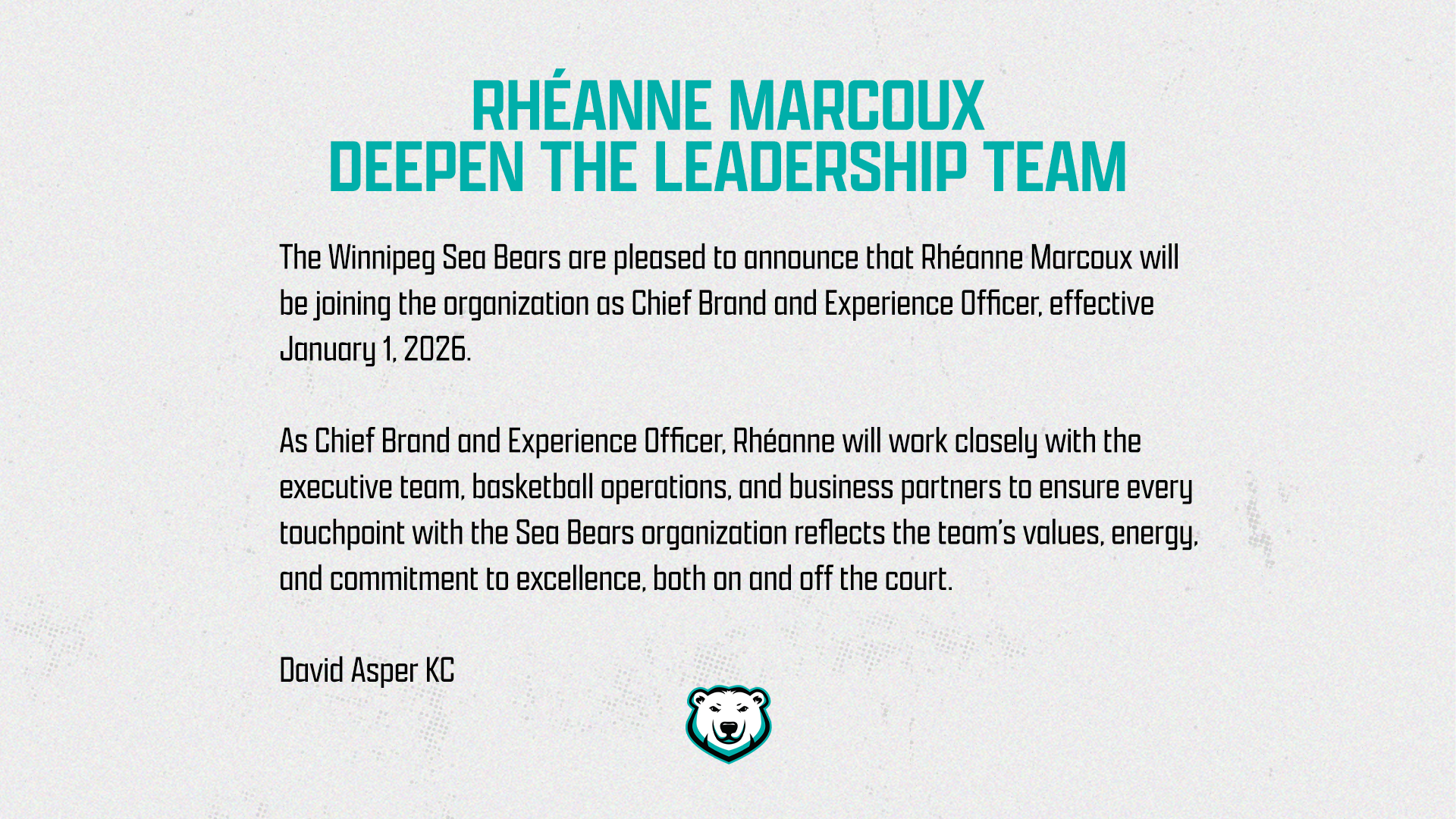LATEST NEWS

Winnipeg, MB, February 19, 2026 — The Winnipeg Sea Bears today announce the signing of Canadian guard David Walker. Walker most recently appeared for the Ottawa BlackJacks in the 2025 Canadian Elite Basketball League season, where on Aug. 16 2025, in a playoff game, he had a standout performance, scoring 19 points, grabbing 4 rebounds, and recording 3 steals in 25 minutes. Prior to his time in Ottawa, he suited up for the Scarborough Shooting Stars in 2025. Walker was also recognized as a finalist for the 2024 CEBL Developmental Player of the Year award. In addition, Walker was a finalist for the 2023 U SPORTS Player of the Year award, recognizing his outstanding performance at the university level and cementing his reputation as one of Canada’s top basketball talents. Over his CEBL career, playing for Brampton Honey Badgers, Scarborough Shooting Stars, and Ottawa BlackJacks, Walker has averaged 8.6 points, 2.9 rebounds, and 0.8 assists per game. “David fits the identity we’re building. He’s a tough, physical Canadian guard with league experience who strengthens our Canadian depth,” said Lead Assistant Coach and Assistant General Manager Alex Campbell. “He defends with purpose, plays hard, and gets downhill offensively. We believe he has tremendous upside, and I think Sea Bears Nation is going to appreciate the way he competes and works every single day.” Walker was originally selected 22nd overall in the 2024 CEBL Draft and began his professional career with the Brampton Honey Badgers, where he averaged 7.3 points and 2.8 rebounds in 16 games during the 2024 season. Before turning professional, Walker starred at Toronto Metropolitan University, averaging 16.5 points, 3.1 rebounds, and 3.5 assists during the 2023–24 season. “I’m grateful for the opportunity to join the Sea Bears,” said Walker. “Winnipeg has built something special, and I’m coming in ready to bring toughness, versatility, and a winning mindset every time I step on the floor.” The 2026 Sea Bears schedule is now available, and so are our Flex Packs! Your tickets, your way. Learn more here: https://www.seabears.ca/flex-packs-2026

Winnipeg, MB, February 3, 2026 – The Winnipeg Sea Bears today announce the re-signing of hometown forward Emmanuel Akot for the 2026 Canadian Elite Basketball League season. Akot, a 6-foot-8 forward, was an essential part of the lineup for the Sea Bears during the 2025 season. In 19 games, he averaged 11.2 points, 5.3 rebounds and 2.2 assists, playing an important role in Winnipeg’s run to the Western Conference Finals. The Winnipeg product delivered several standout performances throughout the season, including a season-high 22 points on 64.3 percent shooting from the field and 50 percent from three, adding six rebounds and two assists in a July 4 matchup against the Niagara River Lions. “Emmanuel brings a high level of athleticism, versatility, and the ability to make big plays at both ends of the floor,” said Head Coach and General Manager Mike Raimbault. “He has guarded multiple positions the last couple of summers and we are excited about having him continue to impact games in a multitude of ways.” Akot returns to Winnipeg as part of the Sea Bears’ protected players list, reinforcing roster continuity as the club builds toward the 2026 season. Akot, a former standout at Western Kentucky, Boise State and Arizona, brings professional experience across multiple international leagues in Canada, Poland and the Netherlands. “It’s an honour to continue wearing the Sea Bears jersey and representing my hometown,” said Akot. “The support in Winnipeg means everything to me, I’m excited for what’s ahead and ready to compete in 2026.” The 2026 Sea Bears schedule is now available, make sure to grab your season tickets here https://www.seabears.ca/season-tickets-2026 ###

Winnipeg, MB, January 28, 2026 — The Winnipeg Sea Bears are pleased to announce that they have agreed to terms with guard Isiah Osborne for the 2026 Canadian Elite Basketball League (CEBL) season. Osborne, a 6’5” guard from Windsor, Ontario, brings a wealth of professional experience to Winnipeg. Across 49 career CEBL games, Osborne has averaged 25.1 minutes, 10.3 points, 2.9 rebounds, and 1.4 assists per game, between the Edmonton Stingers, Montréal Alliance, and Ottawa BlackJacks. “Isiah’s background as a dynamic offensive player and his athletic capabilities made him an ideal fit for our system,” said Head Coach and General Manager Mike Raimbault. “He brings positional size and versatility at both ends of the floor and has the ability to impact winning in a variety of ways.” “I’ve hit big shots in this league, but nothing comes without hard work and teammates who make winning possible,” said Osborne. “That’s why I’m excited to come to Winnipeg. I’m grateful for the opportunity and I’m coming in ready to grind.” Osborne is currently competing with Energa Kotwica Kołobrzeg in Poland. Prior to turning professional, Osborne appeared in 23 NCAA games with the University of Texas at El Paso. He then spent two seasons at Carleton University (2018–2020), where he played 43 U SPORTS games and helped lead the Ravens to back-to-back U SPORTS national championships. Osborne earned All-Star honours in both seasons and was named U SPORTS Championship MVP in 2020. Osborne has played professionally in Canada with the Stingers, Surge, and Alliance, as well as internationally in Finland (Kouvot), Greece (Maroussi), Latvia (Rīgas Zeļļi), Lithuania (Prienų and Gargždų), and Romania with CSM Corona Brașov of the Rome DivA league. Season tickets for the 2026 Winnipeg Sea Bears season are on sale now and can be purchased online at https://www.seabears.ca/season-tickets-2026 ###

Winnipeg, MB — January 15, 2026 — The Canadian Elite Basketball League (CEBL) officially released the 2026 schedule today, setting the stage for another high-energy summer at Canada Life Centre. The Sea Bears will once again bring fast-paced CEBL action to downtown Winnipeg with a home slate packed with marquee matchups, national broadcasts, and fan-favourite theme nights. The Sea Bears home slate tips off with a Prairie rivalry matchup on Saturday, May 16 at 7:00 PM, when the Saskatchewan Professional Basketball Club comes to town. Winnipeg then hosts the Niagara River Lions on Friday, May 22 at 7:00 PM, kicking off an early season stretch that sets the tone for the summer ahead. June brings a strong run of marquee opponents and fan-friendly start times, starting with the Calgary Surge on Friday, June 12, followed by the Vancouver Bandits on Thursday, June 18. The Sea Bears welcome the Edmonton Stingers for a weekend matinee on Saturday, June 20 at 3:00 PM, a weekend afternoon tip-off ideal for families. Winnipeg then host Saskatchewan once again on Tuesday, June 30, a Canada Day Eve matchup that has quickly become a staple on the summer sports calendar. The home schedule continues through July with Edmonton returning on Thursday, July 9, before two afternoon matchups Sunday, July 12 versus Calgary and Sunday, July 19 against the Montreal Alliance. Vancouver returns to Winnipeg Thursday, July 23, and the Brampton Honey Badgers come to town on Saturday, July 25 for the last matinee game on the calendar. The Sea Bears close the regular-season home schedule with the Ottawa BlackJacks on Friday, July 31 at 7:00 PM. With a mix of weekend matinees, prime-time weekday tips, and rivalry matchups, the 2026 home schedule is built to make Sea Bears basketball a centerpiece of summer in Winnipeg. January 15 is the season ticket member renewal deadline. This is the final opportunity to renew existing seats or purchase new season tickets and be entered to win tickets for the entire 2026 Sea Bears season. Fans are encouraged to act now to secure their spot at Canada Life Centre and be part of another unforgettable summer of Sea Bears basketball. The full 2026 Winnipeg Sea Bears schedule is available now.

Winnipeg, MB, January 8, 2026 — The Winnipeg Sea Bears are pleased to announce that they have agreed to terms with forward Nathan Bilamu for the upcoming season. Bilamu (6-5; born August 7, 2000 in Hamilton, ON) returns to Winnipeg after a productive 2025 season with the Sea Bears in the Canadian Elite Basketball League (CEBL). In his rookie professional season with Winnipeg, he appeared in 20 games and averaged 5.5 points and 3.1 rebounds per game, showing consistent effort and earning increased playing time as the season progressed. “We are excited to have Nate back as he builds on what he started here," said Head Coach and General Manager, Mike Raimbault. "Last summer he brought a tremendous commitment to the team, specifically a passion for winning that showed in his effort and willingness to do whatever it took to help this group.” Before joining Winnipeg, Bilamu enjoyed a standout university career at Lakehead University, where he emerged as a versatile two-way player. In his senior season (2024-25), Bilamu averaged 19.7 points, 4.5 rebounds and 3.8 assists per game. He was named an Ontario University Athletics (OUA) First-Team All-Star and a U-SPORTS Second-Team All-Canadian. Following his time in the CEBL, Bilamu continued his professional career overseas with Esgueira Basket in Portugal’s Liga Portuguesa de Basquetebol. Through early 2025-26 international competition, he has been a key rotation player, averaging around 12.4 points and 4.1 rebounds per game while logging significant minutes. The season ticket member renewal deadline is January 15, 2026. Fans can renew or purchase new season tickets at https://www.seabears.ca/season-tickets-2026 . ### About the Winnipeg Sea Bears The Winnipeg Sea Bears joined the Canadian Elite Basketball League (CEBL) as an expansion franchise in 2023. The city's only professional basketball team plays out of Canada Life Centre from May to August in a 24-game regular season schedule. Winnipeg businessman and lawyer, David Asper, is the organization's owner and chairman. More information on the Sea Bears can be found at seabears.ca and @wpgseabears on Instagram , X , TikTok , LinkedIn & Facebook . About the CEBL A league created by Canadians for Canadians with a mission to develop Canadian players, coaches, sports executives, and referees, the CEBL boasts the highest percentage of Canadian players of any pro league in the country with 75% of its rosters being Canadian and a record 12 players with NBA experience in 2024. Players also bring experience from the NBA G League, top international pro leagues, the Canadian National team program, NCAA programs, as well as U SPORTS and CCAA. More than 20 players have signed NBA contracts following a CEBL season, and numerous CEBL players attend NBA G League training camps every year. The CEBL season runs from May through August with games broadcast live on CEBL+ , TSN, TSN+, RDS, Game+ and Next Level Sports & Entertainment. More information about the CEBL is available at CEBL.ca and @cebleague on Instagram , Twitter , TikTok , LinkedIn , Facebook & YouTube .

Winnipeg, MB, December 11, 2025 — The Winnipeg Sea Bears are pleased to announce that they have agreed to terms with point guard Xavier Moon for the 2026 season. Moon (6-2; Morehead State; born January 2, 1995, in Goodwater, AL) is a three-time Canadian Elite Basketball League (CEBL) Player of the Year and brings elite scoring, playmaking ability, and professional experience from international leagues, the CEBL, and the NBA. The Goodwater, Alabama native played two seasons at Northwest Florida State College, helping the program win the National Junior College Championship. He later transferred to Morehead State, where he played two seasons and averaged 16.0 points, 4.6 assists, and 3.4 rebounds in his senior year, earning First Team All-Ohio Valley Conference honours. "I believe adding Xavier to our organization brings tremendous value both on and off the court. He’s a proven winner and someone who has shown he can excel in this league and at the NBA level,” said Winnipeg Sea Bears Head Coach and General Manager Mike Raimbault. “He’s a true professional who understands the importance of our community and our fans, and we’re confident the impact he makes off the court will be just as significant as what he brings on it." Moon has spent time overseas, in North American pro leagues, and across multiple seasons in the CEBL. In 2021, he averaged a league-leading 23.1 points per game on his way to a third straight Player of the Year award and All-CEBL First Team recognition. That season included a 39-point performance, which stood as the CEBL single-game scoring record at the time. 2026 season tickets are now on sale starting at just $27 per game and can be purchased at www.seabears.ca/season-tickets-2026 . ### About the Winnipeg Sea Bears The Winnipeg Sea Bears joined the Canadian Elite Basketball League (CEBL) as an expansion franchise in 2023. The city's only professional basketball team plays out of Canada Life Centre from May to August in a 24-game regular season schedule. Winnipeg businessman and lawyer, David Asper, is the organization's owner and chairman. More information on the Sea Bears can be found at seabears.ca and @wpgseabears on Instagram , X , TikTok , LinkedIn & Facebook . About the CEBL A league created by Canadians for Canadians with a mission to develop Canadian players, coaches, sports executives, and referees, the CEBL boasts the highest percentage of Canadian players of any pro league in the country with 75% of its rosters being Canadian and a record 12 players with NBA experience in 2024. Players also bring experience from the NBA G League, top international pro leagues, the Canadian National team program, NCAA programs, as well as U SPORTS and CCAA. More than 20 players have signed NBA contracts following a CEBL season, and numerous CEBL players attend NBA G League training camps every year. The CEBL season runs from May through August with games broadcast live on CEBL+ , TSN, TSN+, RDS, Game+ and Next Level Sports & Entertainment. More information about the CEBL is available at CEBL.ca and @cebleague on Instagram , Twitter , TikTok , LinkedIn , Facebook & YouTube .

Winnipeg, MB – November 26, 2025 - The Winnipeg Sea Bears are pleased to announce that Rhéanne Marcoux will be joining the organization as Chief Brand and Experience Officer , effective January 1, 2026 . An alum of Red River College and the University of Winnipeg, Rhéanne has had a progressive and distinguished career in broadcast journalism, sports marketing and as an entrepreneur with her own creative agency. She’s worked with Radio Canada, True North Sports and Entertainment and has spent the past 11 years with the Winnipeg Blue Bombers, most recently as Vice President Marketing and Communications for the 112 th Grey Cup. In this newly created executive role, Rhéanne will be responsible for leading the Sea Bears’ overall brand strategy, fan and guest experience, marketing, and community engagement. She will oversee the development of integrated campaigns, in-venue and digital experiences, and partnerships that deepen the connection between the Sea Bears and fans across Manitoba and beyond. “Rhéanne brings a rare combination of strategic brand insight and a deep understanding of what makes live sports unforgettable,” said David Asper, Chair and CEO of the Winnipeg Sea Bears. “As we continue to grow our fan base and our impact in the community, her leadership will be critical in shaping how people experience Sea Bears basketball – not just on game day, but every day of the year.” As Chief Brand and Experience Officer, Rhéanne will work closely with the executive team, basketball operations, and business partners to ensure every touchpoint with the Sea Bears organization reflects the team’s values, energy, and commitment to excellence, both on and off the court. “Stepping into this role feels incredibly meaningful. The Sea Bears have ignited something special in our city, and I’m grateful for the opportunity to help shape the next chapter of that story,” said Rhéanne. “Winnipeg fans bring a level of passion and pride that is truly unmatched, and I’m looking forward to building on experiences that honour that spirit.” Rhéanne will be completing her current duties with the Winnipeg Blue Bombers and will assume her new role with the Winnipeg Sea Bears on January 1, 2026 . ### About the Winnipeg Sea Bears The Winnipeg Sea Bears joined the Canadian Elite Basketball League (CEBL) as an expansion franchise in 2023. The city's only professional basketball team plays out of Canada Life Centre from May to August in a 24-game regular season schedule. Winnipeg businessman and lawyer, David Asper, is the organization's owner and chairman. More information on the Sea Bears can be found at seabears.ca and @wpgseabears on Instagram , X , TikTok , LinkedIn & Facebook . About the CEBL A league created by Canadians for Canadians with a mission to develop Canadian players, coaches, sports executives, and referees, the CEBL boasts the highest percentage of Canadian players of any pro league in the country with 75% of its rosters being Canadian and a record 12 players with NBA experience in 2024. Players also bring experience from the NBA G League, top international pro leagues, the Canadian National team program, NCAA programs, as well as U SPORTS and CCAA. More than 20 players have signed NBA contracts following a CEBL season, and numerous CEBL players attend NBA G League training camps every year. The CEBL season runs from May through August with games broadcast live on CEBL+ , TSN, TSN+, RDS, Game+ and Next Level Sports & Entertainment. More information about the CEBL is available at CEBL.ca and @cebleague on Instagram , Twitter , TikTok , LinkedIn , Facebook & YouTube .

Winnipeg, MB – The Winnipeg Sea Bears announced today that the team has renewed its lease at Canada Life Centre for an additional three seasons. The agreement ensures that Manitoba’s professional basketball team will continue to call the downtown arena home through the 2028 season. Since tipping off in 2023, the Sea Bears have drawn record-breaking crowds and created unforgettable moments at Canada Life Centre, establishing the arena as one of the premier basketball venues in Canada. “Canada Life Centre has been an incredible venue for us to play in and grow the game of basketball in Manitoba,” said Team Owner, David Asper. “The atmosphere our fans create in this building is unmatched in the league, and we are thrilled to keep building on that energy in the years ahead.” The Sea Bears thank True North Sports + Entertainment for their continued partnership and support. “We are deeply grateful to True North Sports + Entertainment for helping us establish our roots and for sharing our vision of growing professional basketball in Winnipeg,” said Asper. “Together, we are creating a home-court experience that is truly special.” “We were thrilled to play a role in the exciting launch of the Sea Bears and share in their excitement as they look ahead,” said Kevin Donnelly, Senior Vice President, Venues & Entertainment for True North Sports + Entertainment. “This is a great product that provides incredible value and entertainment for the fans. We congratulate the Sea Bears organization on a great start and share their long-term vision.” The lease renewal marks another exciting step forward for the Sea Bears as the team continues to expand its reach both on and off the court, inspiring the next generation of athletes and uniting the community through basketball.

WINNIPEG – The Winnipeg Sea Bears and Travel Manitoba will be sending another lucky family north this October. The Zirk family were the 2025 winners of the team’s “See the Bears” contest. The contest ran throughout the season at every home game, giving fans in attendance the chance to enter to win the dream trip, valued at more than $29,400. Thanks to Travel Manitoba and Frontiers North Adventures, the Zirk family will enjoy a round-trip adventure to Churchill, including: A full-day Tundra Buggy Adventure Churchill Town & Area Tour, Polar Bears International House and Parks Canada Presentation Accommodation and meals throughout the trip With the 2025 season wrapped, the Sea Bears now turn their attention to an exciting 2026, when the team will build on a landmark year and continue growing the game across Manitoba. Season tickets for 2026 are on sale now. For more information, visit seabears.ca.

WINNIPEG – The Winnipeg Sea Bears of the Canadian Elite Basketball League (CEBL), together with the True North Youth Foundation, are proud to announce the donation of proceeds from the 2025 Cambrian Credit Union 50/50 program. A total of $54,250 was raised, thanks to the generous support of Sea Bears fans. Of this amount, 70% will support our ongoing partnership with Buckets & Borders, whose community basketball projects continue to revitalize spaces and bring people together through the game. The remaining 30% will support Project 11, the True North Youth Foundation’s mental health initiative that provides free in-classroom programming for students from kindergarten through Grade 12. This summer, with the support of 50/50 proceeds, Buckets & Borders completed two major basketball court restoration projects: Northwood Community Centre and R.B. Russell Vocational School. Both courts now provide vibrant, accessible spaces for youth to play and connect, and the Sea Bears and Buckets & Borders are already planning additional projects in the coming years to grow basketball across Manitoba. “Winnipeg’s basketball scene is thriving. To help fuel that growth, Buckets & Borders proudly partnered with the Winnipeg Sea Bears to restore basketball courts all over the city, an ongoing partnership since 2023. Proceeds from the in-game 50/50 draw are vital to continuing this work, and we’re deeply grateful to the Sea Bears’ fans for their generous support.” said Justin Lee, CEO of Buckets & Borders. "As a member-owned financial institution with deep ties to our community, Cambrian is proud to support the Winnipeg Sea Bears and the incredible work being done through the 50/50 program," said David Mortimer, President & CEO, Cambrian Credit Union. "Seeing the proceeds go directly to revitalizing community spaces and supporting youth mental health aligns perfectly with our commitment to creating positive change in the communities we serve." “The Sea Bears remain deeply committed to making a positive impact in our community and working alongside incredible organizations like Buckets & Borders and Cambrian Credit Union allows us to create opportunities that go beyond the game, building connections, celebrating inclusivity, and helping make Winnipeg an even stronger, more vibrant place to live” said Jason Smith, President of the Winnipeg Sea Bears. ###
